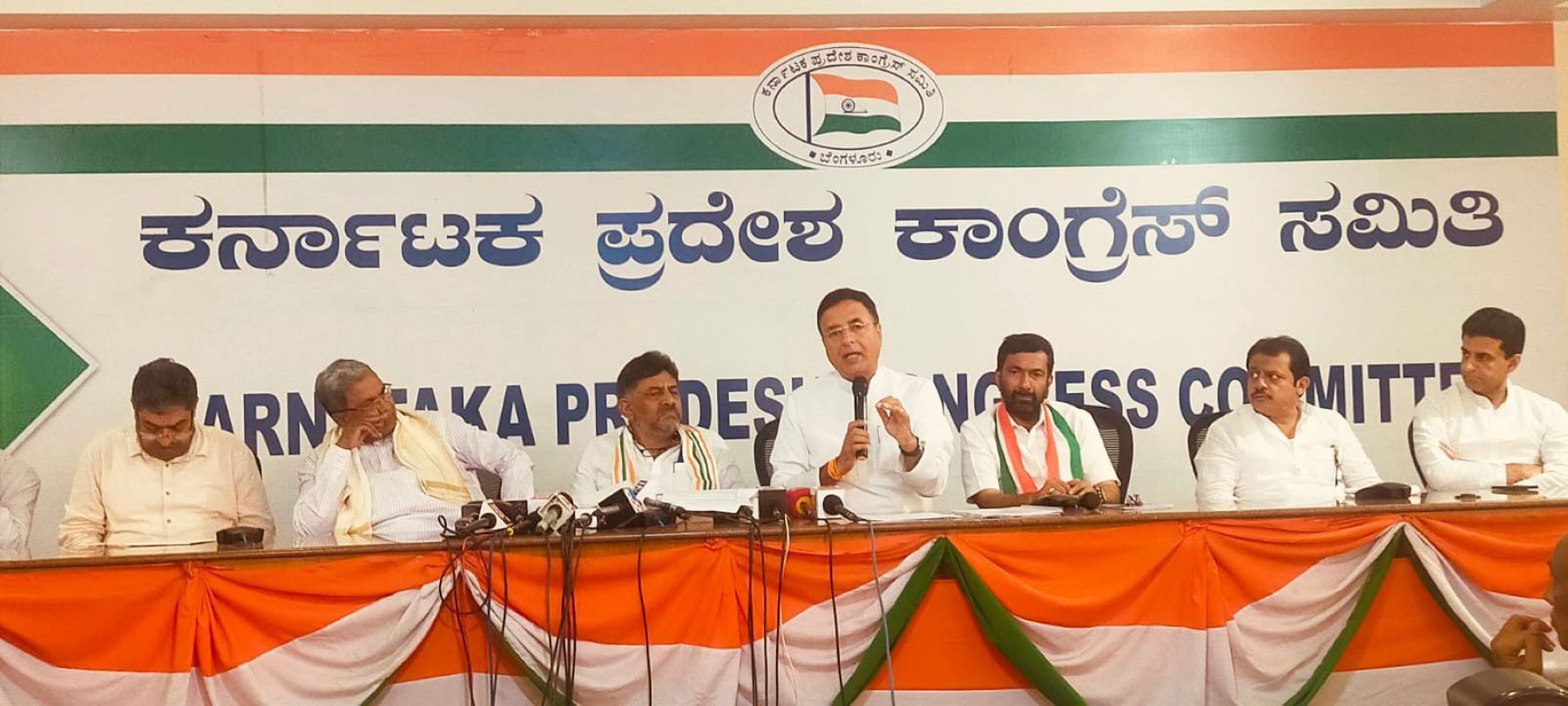He said the state government had declared 223 taluks among the total 236 as drought-hit, and there is a loss of crop in 48.19 lakh hectare.

AICC general secretary and Rajya Sabha member Randeep Singh Surjewala. (KPCC)
Congress General Secretary and Karnataka in-charge Randeep Singh Surjewala, on Wednesday, 3 January, urged the Union government to immediately release grants to the state, including drought relief, without any further delay.
He also questioned the “silence” of BJP MPs on the matter.
In a statement in Bengaluru, he said that the state government had declared 223 taluks among the total 236 as drought-hit, and there is a loss of standing crop in over 48.19 lakh hectare, as per study report from experts.
The small and marginal farmers are in dire straits, Surjewala said.
“The state government, in a memorandum to the Union government, had sought to release ₹18,177.44 crore relief funds, which included ₹4,663.12 crore towards input subsidy, ₹12,577.86 crore for emergency relief and another ₹363.68 crore to save cattle heads. However, the Union government plays deaf to the state’s memorandum,” he alleged.
Karnataka Chief Minister Siddaramaiah and Revenue Minister Krishna Byre Gowda had met Prime Minister Narendra Modi and Home Minister Amit Shah and appealed for the release of central aid to Karnataka, Surjewala noted.
Deputy Chief Minister DK Shivakumar had also met the Union Finance Minister Nirmala Sitharaman and other senior officials of the Agriculture Ministry and presented a memorandum, but still a “mute response” from the Centre, Surjewala said.
“The Union government should also take steps to release other stalled grants,” he said.
He also alleged that MPs from Karnataka remain mute spectators on the Union government’s “injustice” to the state and criticised them for not responding to the plight of farmers in great distress.
“They are waiting for immediate relief from the Union government. There are 26 BJP and one BJP-supported MPs in Karnataka, I fail to understand what they are doing to support the distressed farmers and people of Karnataka,” Surjewala said.
Siddaramaiah had, on 1 January, said that the state incurred a crop loss of ₹35,000 crore in 48 lakh hectares due to the drought and asserted that relief from the government will not be sufficient if nature does not support it.
“We have incurred a crop loss of ₹35,000 crore in 48 lakh hectares in the state due to the drought. Relief from the government will not be sufficient if nature does not support us. We are facing this situation due to climate change. Good rains are expected during the monsoon in 2024. I pray to God for a good monsoon,” he said after exchanging greetings with the government secretaries.
On 19 December last year, Siddaramaiah met with Prime Minister Narendra Modi in New Delhi and requested him to release drought relief funds amounting to ₹18,000 crore to the state at the earliest.
In his letter to the Prime Minister, Siddaramaiah stated that Karnataka has assessed the crop damage and is seeking an input subsidy of ₹4,663.12 crore from the National Disaster Response Funds (NDRF).
Around 48.19 lakh hectares of agriculture and horticulture crops have suffered losses ranging from 33 percent to 100 percent, with a majority of the areas reporting a loss of more than 80 percent.
Small and marginal farmers are the most affected, as about 83 percent of the land area under cultivation is covered under Small and Medium Farmholdings (SMF); hence, this land area is important to determine the input subsidy payable to the state, the Chief Minister’s letter stated.
Karnataka’s request is to consider the area under SMF holdings as per the Aadhaar-enabled FRUITS digital database and release the relief funds, Siddaramaiah’s letter stated.
The 2015-16 agriculture census shows that in Karnataka, 43.94 percent of the land area belongs to SMF holdings. However, as per the FRUITS database, 83 percent of the land is covered by holdings that belong to small and marginal farmers.
The Chief Minister also met with Union Home Minister Amit Shah in the same regard.
On 27 October last year, Siddaramaiah questioned the Union government and Prime Minister Narendra Modi over the alleged delay in providing drought relief to the state and asked whether the BJP government was taking “revenge” on the state.
He pointed out that a Central team that visited Karnataka to study the situation was convinced about it, yet there was no response from Prime Minister Modi or the BJP-led NDA government.
The Karnataka government had, on 4 October, informed the 10-member, inter-ministerial central team (IMCT), which was on a four-day visit to take stock of the drought situation, that this time, the state was facing a “green drought” and requested that the assessment be made based on factors like crop growth and yield.
The IMCT, led by the Joint Secretary of the Department of Agriculture and Farmers Welfare, met the Cabinet Subcommittee on Disaster Management — consisting of the state’s Cabinet ministers and top officials — and followed it up by meeting Chief Minister Siddaramaiah.
“We have discussed the drought situation in detail with the Central team and have given them the entire picture of its effect, especially on the farmers and their financial condition. We have also shared with them information on crop loss, estimates of loss — in how much acreage, along with data, statics and spot inspection reports, for about two hours,” Revenue Minister Krishna Byre Gowda had said then.
A green drought is generally understood to mean a period when there is limited rainfall due to which there is growth of new plants, but the growth is insubstantial.
(With PTI inputs)

Jul 27, 2024

Jul 26, 2024

Jul 26, 2024

Jul 26, 2024

Jul 26, 2024

Jul 26, 2024